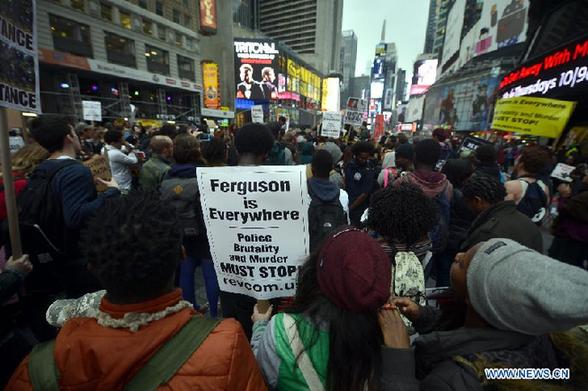Violence is not the answer
china.org.cn / chinagate.cn by Mitchell Blatt, December 3, 2014 Adjust font size:
|
People take part in a protest in New York, the United States, on Dec. 1, 2014. Demonstrations continue over a grand jury's decision last week not to charge police officer Darren Wilson who fatally shot unarmed 18-year-old Michael Brown in Ferguson, Missouri. [Photo/Xinhua] |
Ferguson, Missouri exploded in a chaotic scene of fire, riots, and looting on the night of Nov. 24. The announcement had just been made that a grand jury had not indicted a police officer in the shooting death of Ferguson resident Michael Brown, and Brown's father, standing outside the police station, yelled, "Burn this bitch down!"
By the time the sun rose, more than a dozen businesses had been burnt, over 150 shots had been fired, and 61 people had been arrested. The next day, some were already trying to justify the violence. "Riots are a necessary part of the evolution of society," Darlena Cunha wrote for Time magazine.
But what good did it do for anyone? Ferguson residents saw their businesses and community places burnt to the ground. Local business owners saw their inventory and property destroyed. The looters got arrested, and everyone in the town now lives under more fear and distrust. Ultimately, Ferguson's people suffer the most when their city goes up in flames.
Such violent actions are also counterproductive to the cause of the protesters. The images of people breaking into Ferguson Market and picking the shop clean aren't going to encourage the public to support the protesters.
Many of the protesters refrained from acting violently. Some Ferguson residents even took up arms to protect a local Conoco gas station. They are angry at what they perceive to be larger patterns of injustice and police brutality.
Everyone is an individual, though, and every individual case needs to be analyzed on its merits. Broad trends that apply in many cases don't apply in every case. If Officer Darren Wilson was not guilty of murder, he shouldn't be convicted of murder, and if there was not enough evidence to indict him, he shouldn't be indicted.
Therein lies the problem with trying to apply a broad frame to individual incidents. If the incident doesn't fit the narrative, activists won't be able to accept it. In Ferguson, the evidence suggests that Brown had stolen a pack of cigarettes from Ferguson Market shortly before Wilson met him and his friend, who were walking on the middle of the road, and Brown got into a fight with Wilson.


